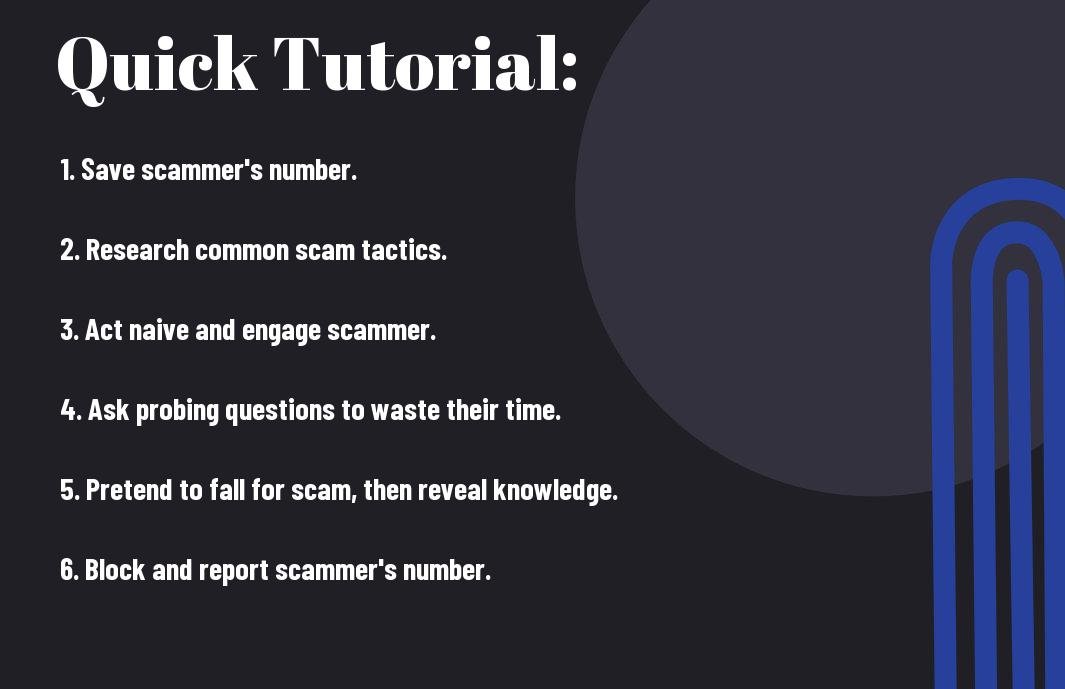How to Scare a Text Scammer – Turn the Tables on Scam Artists
- Home
- How to Scare a Text Scammer – Turn the Tables on Scam Artists

How to Scare a Text Scammer – Turn the Tables on Scam Artists
Have you ever received a suspicious text message from an unknown number claiming that you’ve won a prize or that there’s a problem with your bank account? I have, and I’ve learned a few tricks to scare off these scammers and protect myself and others from falling victim to their schemes. In this tutorial, I’ll share some simple yet effective methods for turning the tables on text scammers, ensuring that you can keep your personal information safe and even have a little fun while doing it. Let’s take control and show these scam artists that their tricks won’t work on us.
Key Takeaways:
- Recognize the signs: Understanding common techniques and signs of text scams is the first step in protecting yourself from scammers.
- Keep personal information private: Never give out personal information, such as social security numbers or passwords, through text message.
- Be wary of urgent or threatening messages: Scammers often use fear tactics to pressure victims into giving up personal information. Be cautious of any urgent or threatening messages.
- Report suspicious texts: If you receive a suspicious text message, report it to your mobile carrier and the Federal Trade Commission.
- Empower yourself: By educating yourself and staying vigilant, you can protect yourself and help prevent others from falling victim to text scams.
Recognizing Text Scams
As a savvy consumer, it’s important to be able to identify text scams before they have a chance to do any damage. Scammers are constantly coming up with new ways to trick people, so it’s crucial to stay informed and vigilant. In this chapter, I’ll outline some of the common types of text scams and provide you with warning signs to look out for.
Types of Text Scams
Phishing Scams
Phishing scams involve a scammer posing as a legitimate organization, such as a bank or government agency, and sending you a text message asking for your personal information. They may claim that there’s a problem with your account and urge you to click on a link to provide your details. Never click on any links in these messages. Phishing scammers are trying to steal your identity and access your accounts.
| Financial Scams | Scammers may send texts claiming that you’ve won a prize or that you owe money. They’ll try to pressure you into responding quickly without thinking it through. Always be skeptical of unsolicited texts asking for money or personal information. |
| Smishing | This is when scammers use text messages to trick you into downloading malware onto your phone. They might send a text posing as a delivery company with a link to track a package, which actually installs malicious software. |
| Survey Scams | These texts will promise a reward for completing a survey, but in reality they’re trying to collect your personal information for nefarious purposes. Be wary of any texts that ask for personal details in exchange for a prize. |
| Charity Scams | Scammers may pose as a charitable organization and ask for donations via text. Make sure to validate the legitimacy of any charity before making a donation, and never do so through an unsolicited text message. |
Warning Signs
Signs of a Text Scam
One of the most common warning signs of a scam text is a sense of urgency, with the sender pressuring you to respond or take action immediately. Another red flag is any text asking for your personal or financial information. Legitimate organizations will never request this kind of information via text. Additionally, spelling and grammatical errors in the message can be a telltale sign of a scam. It’s important to stay diligent and never give out your information to an unsolicited text message.
Turning the Tables on Scammers
While it may seem intimidating to confront a text scammer, there are ways to turn the tables and take back the power. Scammers rely on the element of surprise and fear to manipulate their victims, but by staying informed and being proactive, you can outsmart them and even scare them off.
Keeping Yourself Safe
When dealing with text scammers, it’s important to remember to never give out personal information such as your social security number, bank account details, or passwords. Scammers will use any information they can gather to steal your identity and rob you of your hard-earned money. Always be skeptical of unsolicited messages and calls, and never click on links or download attachments from unknown senders. If you receive a text from an unknown number, don’t engage or respond – simply block and delete the message.
Taking Action Against Scammers
If you suspect that you have been targeted by a text scammer, it’s important to report the incident to the relevant authorities. By reporting the scam, you not only protect yourself, but you also help prevent others from falling victim to the same fraud. You can report text scams to the Federal Trade Commission (FTC) by visiting their website or calling their toll-free number. Additionally, you can forward any suspicious messages to your mobile carrier by sending a text to 7726 (SPAM).
Fighting Text Scams
After receiving a text scam, you may feel angry and helpless. But you don’t have to be a victim. There are steps you can take to fight back against text scammers and protect yourself from being a target in the future.
Reporting Scams
When you receive a text scam, it’s important to report it to the appropriate authorities. This not only helps protect others from falling victim to the scam, but it also helps law enforcement track down and prosecute the scammers. You can report text scams to the Federal Trade Commission (FTC) by forwarding the scam message to 7726 (SPAM) and then delete the message from your phone. You can also report the scam to your wireless carrier, as they may be able to block future messages from the same sender.
Spreading Awareness
One of the best ways to fight text scams is to spread awareness about them. Educate your friends and family about the common tactics used by text scammers, such as phishing links and fake prize notifications. Encourage them to be cautious and skeptical of any unsolicited text messages. By raising awareness, you can help prevent others from falling victim to these scams and protect your community from dangerous fraudsters.

Conclusion
On the whole, scammers thrive on fear and intimidation, but by turning the tables on them, you can reclaim the power and protect yourself and others from falling victim to their schemes. I have learned that by staying informed, remaining calm, and utilizing the right strategies, you can scare off text scammers and potentially shut down their operations. Whether it’s by wasting their time, calling them out on their lies, or reporting them to the appropriate authorities, taking a stand against text scammers is crucial in the fight against fraud. By being proactive and vigilant, you can make a difference and help dismantle the networks of these scam artists, ultimately making the digital world a safer place for everyone. Don’t let scam artists intimidate you – take control and turn the tables on them.
FAQ
Q: What is a text scammer?
A: A text scammer is someone who uses deceptive text messages to try and scam people out of money or personal information. They often pose as legitimate companies or individuals in order to trick their victims.
Q: How can I recognize a text scam?
A: Text scams often use urgency and fear tactics to convince you to act quickly without thinking. They may claim that you owe money, your account has been compromised, or you’ve won a prize. Look out for spelling and grammar mistakes, requests for personal information, or suspicious links.
Q: What should I do if I receive a text from a scammer?
A: The best thing to do is to not engage with the scammer at all. Do not click on any links or respond to the message. Instead, you can report the scam to your mobile carrier by forwarding the message to 7726 and block the number so you don’t receive any further messages.
Q: How can I turn the tables on a text scammer?
A: One way to turn the tables on a text scammer is to waste their time. Engage with them and ask a lot of questions without providing any real information. This can frustrate the scammer and prevent them from targeting others while they’re focused on you.
Q: Is it safe to try and scare a text scammer?
A: While it can be satisfying to mess with a scammer, it’s important to remember that they are often part of larger criminal organizations. Engaging with them can potentially make you a target, so it’s best to report and block them rather than trying to scare or confront them directly.
- Share
Mark Twain
Mark Twain stands at the helm of Create More Flow, infusing every sentence with the wisdom of his 15-year expeience through the seas of SEO and content creation. A former BBC Writer, Mark has a knack for weaving simplicity and clarity into a tapestry of engaging narratives. In the realm of content, he is both a guardian and a guide, helping words find their flow and stories find their homes in the hearts of readers. Mark's approach is grounded in the belief that the best content feels like a chat with an old friend: warm, inviting, and always memorable. Let Mark's expertise light up your website with content that's as friendly to Google as it is to your audience. Each word is chosen with care, each sentence crafted with skill - all to give your message the human touch that both readers and search engines love.
